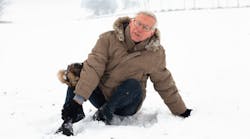It might feel a bit early for retailers to start their annual blitz of Christmas commercials, but it’s not too early to start thinking about winter safety.
During last year's difficult Midwest winter, slips and falls on ice and snow accounted for nearly one-third of all workers’ compensation claims that resulted in lost time from work, according to two leading workers’ compensation carriers.
Winter-related slips and falls claims doubled in 2013-2014 over the previous year, representing 29 percent of all workers' compensation claims, according to Accident Fund Insurance Company of America and United Heartland.
Here's the breakdown by states:
- Indiana – 37 percent
- Wisconsin – 33 percent
- Michigan – 32 percent
- Illinois – 32 percent
- Minnesota – 29 percent
Although statistically significant claims data not was available for other states, trends were consistent throughout cold-weather regions of the United States.
“Winter-related slips and falls have a significant negative impact on American businesses each year, resulting in time off work, temporary-employee costs, overtime for existing employees and increased insurance costs,” said Mike Britt, president of Accident Fund Insurance Company of America. “To avoid these costs this winter, employers need to be extra vigilant and employees should exercise extreme caution in the months ahead.”
Simple Tips to Avoid Injury
To help avoid injury when walking on ice and snow, Accident Fund and United Heartland offer these simple tips:
- Walk slowly and deliberately and wear boots or other slip-resistant footwear.
- Be prepared for black-ice formation after melting occurs.
- Exercise caution when getting in and out of vehicles.
- Watch for slippery floors when entering buildings.
- Avoid carrying items. Keep hands empty so arms are free to move for stabilization. Use backpacks if possible.
Loss prevention experts from Accident Fund and United Heartland will launch their annual safety campaigns this month. Beginning with snow- and ice-removal plans, the campaign addresses topics ranging from proper salting and shoveling techniques to the importance of wearing the right footwear, and gives employers the resources and ideas necessary to create a campaign to help reduce costly workplace accidents.
“Although we can’t change the weather, we can do much more to prepare and keep workers safe, beginning with some common-sense reminders,” added Steve Cooper, president of United Heartland.
